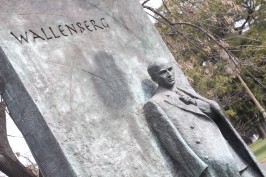The Wallenberg Foundation must not indemnify grandson of Argentine diplomat accused of letting Argentine Jews die by the hands of the Nazis during WWII
Argentine Supreme Court of Justice overturned a judgment in favor of the grandson of a diplomat stationed at the Argentine Embassy in Berlin during the Nazi regime. After the “International Raoul Wallenberg Foundation” had accused the diplomat of letting Argentine Jews die, the diplomat´s grandson sued the Foundation for damages. Now, the Highest Court held that “it cannot be deemed to be a gratuitous insult; on the contrary, it is a harsh questioning, of a kind not unusual in historical disputes.”
Juan Carlos Hipólito Irigoyen, grandson of Luis Hernán Irigoyen, former diplomat stationed at the Argentine Embassy in Berlin during the Nazi regime, sued “The International Raoul Wallenberg Foundation” for damages. The defendant had stated that the plaintiff’s grandfather was “responsible for letting approximately 100 Argentine Jews die in the gas chambers.”
The complaint in the case “Irigoyen, Juan Carlos Hipólito c/Fundación Wallenberg y otros/ daños y perjuicios”, (“Irigoyen, Juan Carlos Hipólito v. Wallenberg Foundation et al/damages”), was successful at first instance and at the Court of Appeals, and the defendant was ordered to pay ARS (Argentine peso) 50,000 (approximately USD 6,000) in compensatory damages.
With the suport of attorneys Israel Imar, Paul Warszawski, Carlos Raúl Sánchez and Gustavo A. Bossert as counsels, the Wallenberg Foundation appealed the decision before the Nation’s Supreme Court of Justice, which with the vote of five of its six Justices, Ricardo Lorenzetti, Elena Highton de Nolasco, Enrique Petracchi, Eugenio Zaffaroni and Juan Carlos Maqueda, upheld the appeal and vacated the prior judgment.
Likewise, in a concurrent opinion, Justice Zaffaroni pointed out that there was no proof whatsoever of the moral harm that defendant plaintiff Irigoyen alleged to have suffered from the criticism to his grandfather, and that merely citing the family´s honor in cases of kinship more remote than the parent-child relationship or fraternal relationship, cannot be sufficient to prove moral harm … otherwise, historical revisionism would become justiciable matter, with the resulting limitation on the freedom of historical research.
The Justices explained that their judgment was “grounded on content taken from the Wallenberg Foundation web page”. The Justices added that “It is plain to see that in many cases it is material taken from different media, with express acknowledgment of the source and deference to the original format.”
In the opinion of the Highest Court, when admitting the complaint in question, the lower courts ignored the legal doctrine whereby “repeating someone else’s words does not result in civil or criminal liability. The content of the information should be attributed to the relevant source, and whatever said source states, should be documented in a substantially accurate transcription.”
Thus, in reference to the Court’s case law in cases like “Dahlgren” or “Ramos”, the Justices recalled that “if the informant could be held liable for the mere fact of repeating someone else’s words, purportedly detrimental to third parties, it is clear that the informant would act as a fearful filter and evaluator of information, rather than its uninhibited channel. That would restrict the amount of information received by people and, at the same time, give the informant the improper role of a censor.”
However, not all claims were taken from texts; some statements were directly attributed to the Foundation, revolving around news of an Argentine Foreign Minister who “ordered the removal of a plaque that had been put up at the (Foreign) Ministry as a tribute to Argentine diplomats who showed solidarity with victims of Nazism.”
“Said plaque included, among others, the name Luis H. Irigoyen, whom the text of the Wallenberg Foundation described as “accessory to the murder of one hundred Argentine Jews during the Holocaust,” mentioned the Court.
In this regard, the Justices understood that such an expression “is one of those in which the priority is not given to the statement of facts, but rather, ideas, opinions, critical or value judgments and, why not, conjectures and hypotheses are what predominate, in accordance with the distinction, between one and the other type of expression, upheld by this Court.”
“Having described Luis H. Irigoyen as an “accessory to” or “responsible for” the disappearance of Argentine Jews in Nazi Germany represents a grave insult related to Irigoyen’s conduct during those years; however, it cannot be deemed to be a gratuitous insult; on the contrary, it is a harsh questioning of a non kind that is not unusual kind in historical disputes.”
“The same could be said of the invoked “complicity” of the plaintiff s grandfather with the Nazi crimes of the Nazi period. The arguments waged in a debate should not be examined under a judicial framework. This would lead to an unfortunate confusion of contexts.” the judgment concluded, making it very clear that, for the Court, such expressions are protected by the Constitution.”
Read the decision of the Argentine Supreme Court (In Spanish)
Translation: IRWF

